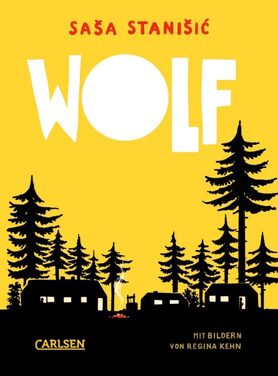Saša StanišićRegina Kehn
Wolf
[Wolf]
- Carlsen Verlag
- Hamburg 2023
- ISBN 978-3-948722-27-2
- 160 Pages
- Publisher’s contact details
Published in Italian with a grant from Litrix.de.
Sample translations
Sleepless in Summer Camp
The boy seems familiar. And so does the environment he reluctantly arrives in. Wolf, the latest children’s novel by multi-award-winning German-Bosnian writer Saša Stanišić, is full of the sounds and scents of the pine forest. The tapping of the woodpecker, the rustling of the leaves, the call of the cuckoo, the chirping of the crickets, the biting of the mosquitoes. The smell of carbonised potatoes rises from the camp fire, the noises of children’s play echo in your ears. - A week at summer camp, in wooden cabins somewhere in the Brandenburg forest. You can almost smell the stale fug of boys socks, see the dribbles of shampoo in the showers. And then of course there’s the aroma of tinned ravioli, reheated.
The jumble of summer camp crowds in on the reader. That’s the first thing that strikes you about the novel: the immediacy of sensory perceptions. That and the fact that the first-person narrator only reveals his name right at the end. The boy, who is somewhere around thirteen, describes his ordeal in vivid language, as if the people reading what he writes are his closest confidantes. Regina Kehn’s fine black-and-white illustrations, are eye-catching and make the book even more of a pleasure to read. The yellow background they’re set against has symbolic significance: the wolf who roams through the book’s pages like a ghost has yellow eyes, too.
So, are we meant to feel sorry for this nameless youngster, who has a sarcastic – and in his more gentle moments ironic – comment for almost everything he comes across? Saša Stanišić places before us a character readers will relate to. And they’ll also relate to those uncertain phases of life when we’re at odds with ourselves, with our fellow human beings and with the unexpected events we find ourselves thrown into. This is exactly the kind of phase the author’s antihero finds himself in: a time when you try to gloss over insecurities and difficult situations with facetious comments and quick judgments.
The boy lives with his mother, who is a single parent and has a job. The two get on well, not least because his mother gives clear and humorous indications when things are threatening to get on top of her. So she doesn’t take any nonsense when she decides to send her offspring to summer camp for a week. The boy, though, rolls out all the arguments he can think of. The bus leaves at bedtime. He’ll be bumping around for 300 kilometres. He’ll have to breathe the same air as 40 of his peers. He may well throw up. He’ll have to put up with annoying announcements by uncool supervisors. He’ll be stuck with a group of people he knows from school: the nice ones, the gamers, the jocks, the straight-A students, the horse girls. And the bullies, of course. And right at the bottom of the food chain sit the misfits. Two of them, to be precise. Jörg, who comes across as gentle, fragile and good-natured. And, of course, the lonesome cowboy with no name – a maverick, a lone wolf: “My class knows me well enough to me ignore me. That’s what you call having a reputation. I have a reputation for complaining and never being in the mood for anything”. But will that lead him and Jörg to join forces?
Although there are things that bring them together – sharing a room, little gestures, agreeing on who the good guys and bad guys are – our nameless protagonist struggles with his moral principles. In theory at least, he’s on Jörg’s side, but in practice he’s completely chicken. When Jörg, the archetypal bullying victim, is picked on yet again by the camp’s top dogs, the narrator holds back. At most, provided no-one else is watching, he looks out for his roommate’s physical and mental wellbeing. As a reader, these tentative ventures down the rocky path toward true friendships are sometimes very touching. Especially when you recall how your own moral courage can fail. But sometimes you just want to shout, “Get a grip! Do the right thing!”
The way Saša Stanišić positions the two outsiders in his story, the way he gets his narrator to reveal his inner feelings to the outside world, the way he recreates the feel of a summer camp full of adolescent boys and girls and situates it in the middle of a dry, sandy pine forest in Brandenburg, the way he inserts into the narrative a quiet little hymn to the joy of marching to the beat of your own drum – it’s all yet more proof of the wonderful, self-assured storytelling of this consummate observer of human nature.
Translated by Sarah Rimmington

By Siggi Seuß
Siggi Seuß, freelance journalist, radio script writer and translator, has been writing reviews of books for children and young people for many years.
Publisher's Summary
Saša Stanišic’s first novel for children encourages differentness.
At a holiday camp Kemi becomes a member of a highly diverse group of youngsters and team-leaders. Here he encounters Jörg, who is somehow even more out on a limb than all the others, and whom he finds particularly interesting. He carefully takes in the way the others treat Jörg and the way the situation within the group gradually escalates. How far will things go? In his dreams Kemi encounters a wolf - his own fear. He learns how to live with the wolf and how to show courage.
Wolf is a masterfully observant children’s novel about how slender the dividing line is between being deemed ‘different’ and being completely othered.
(Text: Carlsen Verlag)
